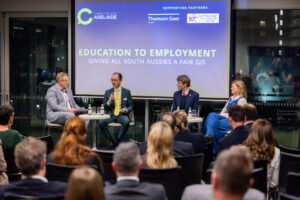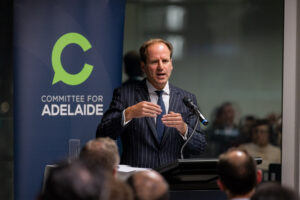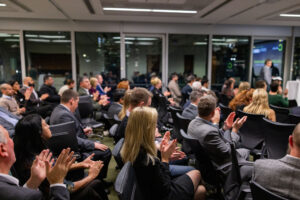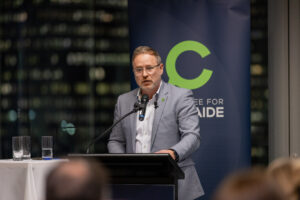Our thought-leadership event, held with the support of Thomson Geer and the Commissioner for Children and Young People (CCYP), explored the South Australian Productivity Commission’s recent report on ‘Positioning all South Australians to Share in the Benefits of Economic Growth’ and discussed how we can collectively give young people the skills and support they need to thrive.
We were fortunate to be joined by Chair of the South Australian Productivity Commission, Adrian Tembel who provided an opening speech on the key findings and recommendations in the report.
Alarmingly, the report shows only 63% of public-school students completed Year 12 in 2023 and around 48,000 young South Australians are either not engaged or only partially engaged in education, training, or employment. South Australia faces one of the highest rates of long-term unemployment in the country, with youth making up a disproportionate 43% of the long-term unemployed, nearly double the national average. The chances of a young South Australians success largely dependent on how educated their parents are and on where they live.
The event explored the barriers facing young South Australians and discussed ideas and solutions to reduce the rate of long-term youth disengagement and deliver better outcomes for all South Australians.
A big thank you to our panellists Mimi Crowe, Acting Commissioner for Children and Young People (CCYP), Zane Le Blond, Chair of the Ministers Youth Advisory Council (YMAC) and Rinat Farukshin, Head of Innovation and Technology at Pinnacle College, for their thoughtful and insightful comments.
Key Take-Aways from the conversation:
- Children and young people want to be part of decision-making, co-designing solutions and shaping curriculum.
- A positive and engaging school experience is crucial for children’s overall wellbeing and development. A fun, joyful and engaging education can foster a love of learning, improve academic outcomes and contribute to a positive sense of self.
- Some young people do not have support or mentorship to help guide them. Teachers and schools play an important role in providing guidance but there is also an opportunity for business leaders and employers to connect in with disadvantaged schools and provide career pathway support and mentorship.
- Education and employment pathways are not always linear. Flexibility in the delivery of curriculum and career pathways can be powerful ways to engage young people.
- Every person we successfully integrate into the workforce represents increased productivity, reduced social costs and enhanced innovation.
- Implementing a ‘can do’ culture is important if we want to deliver the systematic change that is required to ensure young people are supported and empowered.
- Leaders across politics, business, the public sector, and community organisations can all play a role in driving change.
Adrian’s keynote speech is available here.
The SAPC report is available here.
Thank you to our Annual Partners, Adelaide University and BHP for their ongoing support of these important conversations. We also extend our thanks to our wine partner, Hentley Farm.



